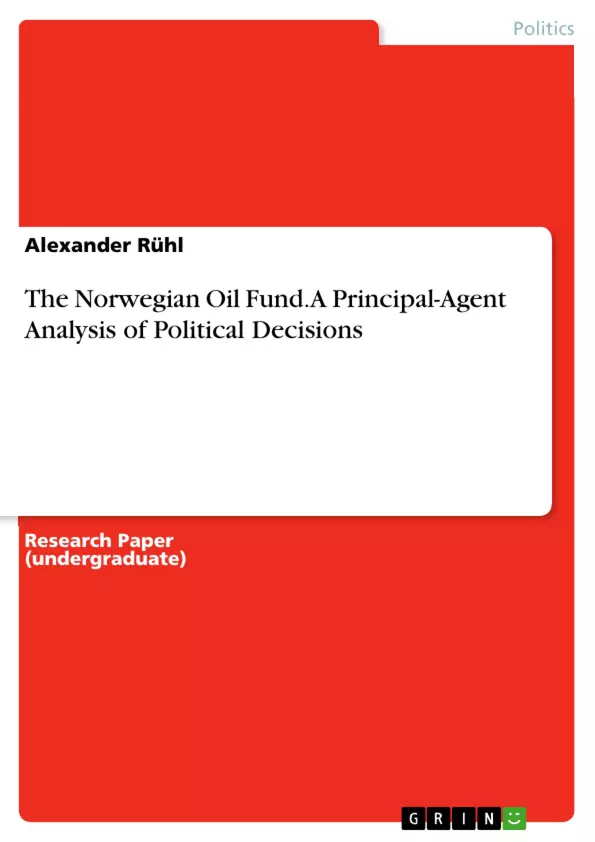This assignment investigates the decisions that were made by Norway's Finance Minister Siv Jensen and Prime Minister Erna Solberg in 2016 to withdraw money from the Government Pension Fund Global in order to compensate for a governmental budget deficit. The starting point will be a brief overview over Norway’s economic situation and a look into the structure and the investment strategy of the oil fund.
The analysis of the decision to plunge into the fund is based on the Principal-Agent Theory and the Consumption-Saving Decision and therefore these theories are explained further on. The political decision is then analysed based on these theories, and outcomes of alternative decisions are depicted.
Inhaltsverzeichnis (Table of Contents)
- Executive Summary
- Table of Contents
- List of Figures
- List of Abbreviations
- Introduction
- Problem Definition
- Objectives
- Methodology
- Main Part
- A Brief Overview of Norway
- Facts About the Oil Fund
- About, Governance, History
- Facts, Investments
- Market Value and Inflow/ Withdrawal
- Principal-Agent Theory
- Basic Idea of Asymmetric Information and Trust
- The Consumption-Saving Decision
- Analysis of Political Decisions
- Results
- Conclusion
- Appendices
- Bibliography
Zielsetzung und Themenschwerpunkte (Objectives and Key Themes)
This assignment analyzes the decision by Norway's Finance Minister Siv Jensen and Prime Minister Erna Solberg in 2016 to withdraw funds from the Government Pension Fund Global to address a governmental budget deficit. It explores the economic context of Norway, the structure and investment strategy of the oil fund, and uses the Principal-Agent Theory and Consumption-Saving Decision to understand the decision and its potential outcomes.
- Norway's economic situation and the structure of the oil fund
- The application of the Principal-Agent Theory to understand the decision-making process
- The role of the Consumption-Saving Decision in analyzing the decision's implications
- An assessment of alternative decisions and their potential outcomes
Zusammenfassung der Kapitel (Chapter Summaries)
- Introduction: Introduces the concept of Norway's Government Pension Fund Global and its impact on the nation's wealth. It highlights the fund's origin in oil revenue and its long-term strategy to benefit future generations.
- A Brief Overview of Norway: Provides a background on Norway's economic situation, including its reliance on oil and gas production. The chapter may include information on the country's history, geography, and economic indicators.
- Facts About the Oil Fund: Delves into the details of the Government Pension Fund Global, covering its governance, history, investment strategies, market value, and inflow/withdrawal mechanisms. The chapter might also discuss the fund's management and investment portfolio.
- Principal-Agent Theory: Explains the fundamentals of the Principal-Agent Theory, emphasizing the concept of asymmetric information and the importance of trust in decision-making processes. It may use examples to illustrate the theory's application.
- Analysis of Political Decisions: Analyzes the decision to withdraw funds from the Government Pension Fund Global in the context of the Principal-Agent Theory and the Consumption-Saving Decision. It examines the motivations behind the decision and its potential consequences.
Schlüsselwörter (Keywords)
This assignment focuses on the Norwegian oil fund, its governance, investment strategies, and the political decisions surrounding its management. Key themes include the Principal-Agent Theory, the Consumption-Saving Decision, and the economic implications of withdrawing funds from the oil fund for Norway's future. The analysis relies on economic principles, political decision-making, and the long-term sustainability of the oil fund.
Frequently Asked Questions
What is the Norwegian Government Pension Fund Global?
Commonly known as the Oil Fund, it is a sovereign wealth fund established to manage Norway's oil and gas revenues for the benefit of current and future generations.
Why did Norway withdraw money from the fund in 2016?
Prime Minister Erna Solberg and Finance Minister Siv Jensen decided to withdraw funds to compensate for a governmental budget deficit caused by economic shifts.
How does the Principal-Agent Theory apply to the Oil Fund?
The theory analyzes the relationship between the "principals" (the Norwegian citizens/future generations) and the "agents" (the politicians) who manage the fund, highlighting issues of asymmetric information and trust.
What is the Consumption-Saving Decision in this context?
It refers to the economic choice of whether to spend (consume) the oil wealth now to solve immediate budget issues or save it for long-term sustainability and future needs.
How is the Oil Fund governed?
The fund has a strict governance structure involving the Ministry of Finance and Norges Bank, with specific investment strategies and ethical guidelines to ensure long-term value.
- Arbeit zitieren
- Alexander Rühl (Autor:in), 2017, The Norwegian Oil Fund. A Principal-Agent Analysis of Political Decisions, München, GRIN Verlag, https://www.grin.com/document/354293



